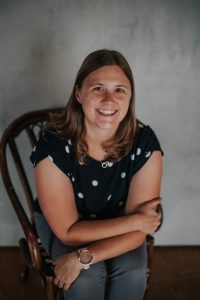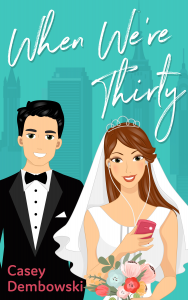
Casey Dembowski
Casey Dembowski is a New Jersey-based author, wife, and mom. Her debut novel, When We’re Thirty, is a contemporary romance that’s been capturing tons of praise. “Romance readers seeking stories of moral and ethical quandaries, love, and relationships of convenience that evolve beyond their initial rules and boundaries will find When We’re Thirty engrossing, fun, and thought-provoking,” according to Midwest Book Review, while Kirkus Reviews wrote, “Dembowski has created genuinely appealing characters… she succeeds in making their unusual relationship journey absorbing and satisfying.” When she’s not writing fiction, Dembowski works in corporate communications.
A full schedule, but Casey was kind enough to carve out a few minutes to talk about marriage pacts and indie music, both of which play major roles in When We’re Thirty; as well as mom and writer guilt; and one superpower she’d like, if given a wish.
A story catalyst in When We’re Thirty is a marriage pact. Will and Hannah, back when they were college students, made a pinky promise to marry each other if they were still single when they turned thirty. Have you ever made a made a similar pact, even for fun?
No! I didn’t have a pact with anyone, or even know anyone that had one. But I wanted to try my hand at a high concept novel and thought it would be fun to write a story about what happens when two people go through with a marriage pact, even though they’re not really friends any more.
One article I’d read about marriage pacts said that many times when people do this, either one or both people actually have feelings for the other. In my story, Will liked Hannah when they made the pact, and still likes her when he initiates it.
What were the most significant changes to Will and Hannah’s story as you wrote and edited?
The bones of story were always there. The biggest change from the first draft involved removing a subplot that centered on Kate, Hannah’s best friend.
Also, I didn’t know initially that Will would have a voice in the story. But I wanted to try writing in third person and that opened door to adding another point of view. I’d been writing from Hannah’s perspective and then in chapter four, she walks out of Brian’s apartment, and Will was there. From there, he exploded on the page.
I loved Hannah’s interest in indie music. Is that also an interest of yours?
Yes! I have a band I love that is alternative rock/pop-punk, and their music has saved me so many times. So I wove that idea into the story.
Will any future stories incorporate Will and Hannah?
I don’t think I’ll do another Will and Hannah story, because they’re pretty happy right now. In romance, happily-ever-after is a given. But to write a book about a character, you have to hurt them in some way. I don’t want to hurt them again!
A lot of people have said they’d like a story about Daniel, Will’s brother. So that’s percolating in the background.
Can you talk about your path to publication? Any lessons learned? Any advice?
When We’re Thirty is actually the second book I wrote. After it sold, things went quickly. It was eight months from sale to publication, which was fast but fun.
Can you give a hint about your next book?
My second book is coming in 2022 and it’s a second chance romance with some interesting family dynamics threaded in. Like in When We’re Thirty, I toe the line between romance and women’s fiction genres. I think many romances today have more women’s fiction in them now than people might think. (In women’s fiction, the main character experiences an emotional journey outside of a romance.)
What are you reading now?
I’m reading Paws & Prejudice, the second book, in the Hearts of Alaska series by Alanna Martin. I’m also listening to The Bromance Book Club by Lyssa Kay Adams, and it has me laughing out loud
How do you manage work, family and writing?
I’ve always written in ‘the in-betweens.’ In graduate school (Casey has an MFA from Adelphi University), when I was writing my thesis, I lived more than an hour from school and was working two or three jobs at a time. I learned to always write when I could fit it in. Now that I juggle a full-time job and being a mom and wife, it’s not as hard to sit down and write in half-hour increments.
Also, I refuse to buy into either writer or mom guilt. If I have a long day and don’t want to write, I don’t feel bad. And if I want to take some personal time to write for a half-hour, I also don’t feel bad.
A lighter question: if you could have one super-power, what would it be?
To not have to sleep! I’d have more time to read and write.
If you had six months to do what you wanted, with no financial constraints, what would you do?
I’ve always wanted to rent house on a beach in Wilmington, North Carolina, and spend time writing and with my daughter and husband. It would be great to be in my happy place for more than a week.
